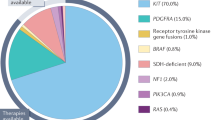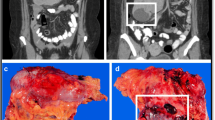Abstract
Although gastrointestinal stromal tumor (GIST) is the most frequent mesenchymal neoplasm of the gastrointestinal tract, until recently it has been an obscure disease. Now, there is widespread scientific and clinical interest in GIST because its principal pathogenetic defect has been identified and a specific molecular inhibitor of GIST has been developed. Most GISTs contain a gain-of-function mutation in thec-kit proto-oncogene. Mutation results in constitutive activation of the Kit receptor tyrosine kinase, which induces cellular proliferation. STI571 is an oral agent that selectively inhibits Kit. It is a landmark development in cancer treatment and marks a new era of targeted molecular therapy. Its efficacy proves that a specific inhibitor can counteract the effects of a genetic defect responsible for neoplasia. Althought ST1571 was first applied to GIST only 2 years ago, it has already revolutionized the treatment of patients with metastatic disease and is also currently being tested as an adjuvant therapy after the resection of primary GIST.
Similar content being viewed by others
References
Kindblom LG, Remotti HE, Aldenborg F, Meis-Kindblom JM. Gastrointestinal pacemaker cell tumor (GIPACT): gastrointestinal stromal tumors show phenotypic characteristics of the interstitial cells of Cajal.Am J Pathol 1998;152:1259–69.
Stout AP. Bizarre smooth muscle tumors of the stomach.Cancer 1962;15:400–9.
Herrera GA, Demoraes HP, Grizzle WE, Han SG. Malignant small bowel neoplasm of enteric plexus derivation (plexosarcoma): light and electron microscopic study confirming the origin of the neoplasm.Dig Dis Sci 1984;29:275–84.
Herrera GA, Cerezo L, Jones JE, et al. Gastrointestinal autonomic nerve tumors. ‘Plexosarcomas’.Arch Pathol Lab Med 1989;113:846–53.
Sarlomo-Rikala M, Kovatich AJ, Barusevicius A, Miettinen M. CD117: a sensitive marker for gastrointestinal stromal tumors that is more specific than CD34.Mod Pathol 1998;11:728–34.
DeMatteo RP, Lewis JL, Leung D, Mudan SS, Woodruff JM, Brennan MF. Two hundred gastrointestinal stromal tumors: recurrence patterns and prognostic factors for survival.Ann Surg 2000; 231:51–8.
Carney JA. The trial of gastric epitheliod leiomyosarcoma, functioning extra-adrenal paraganglioma, and pulmonary chondroma.Cancer 1979;43:374–82.
Miettinen M, Sarlomo-Rikala M, Lasota J. Gastrointestinal stromal tumors: recent advances in understanding of their biology.Hum Pathol 1999;30:1213–20.
Ng EH, Pollock RE, Munsell MF, Atkinson EN, Romsdahl MM. Prognostic factors influencing survival in gastrointestinal leiomyosarcomas. Implications for surgical management and staging.Ann Surg 1992;215:68–77.
Crosby JA, Catton CN, Davis A, et al. Malignant gastrointestinal stromal tumors of the small intestine: a review of 50 cases from a prospective database.Ann Surg Oncol 2001;8:50–9.
Pollock J, Morgan D, Denobile J. Williams J. Adjuvant radiotherapy for gastrointestinal stromal tumor of the rectum.Dig Dis Sci 2001;46:268–72.
Ng EH, Pollock RE, Romsdahl MM. Prognostic implications of patterns of failure for gastrointestinal leiomyosarcomas.Cancer 1992;69:1334–41.
Edmondson J, Marks R, Buckner J, Mahoney M. Contrast of response to D-MAP+sargramostim between patients with advance malignant gastrointestinal stromal tumors and patients with other advanced leiomyosarcomas.Proc Am Soc Clin Oncol 1999; 18:541.
Goss G, Merriam P, Manola J, Singer S, Fletcher C, Demetri G. Clinical and pathological characteristics of gastrointestinal stromal tumors.Proc Am Soc Clin Oncol 2000;19:2203.
Plaat BE, Hollema H, Molenaar WM, et al. Soft tissue leiomyosarcomas and malignant gastrointestinal stromal tumors: differences in clinical outcome and expression of multidrug resistance proteins.J Clin Oncol 2000;18:3211–20.
Berthet B, Sugarbaker TA, Chang D, Sugarbaker PH. Quantitative methodologies for selection of patients with recurrent abdominope vic sarcoma for treatment.Eur J Cancer 1999;35:413–9.
Eilber FC, Rosen G, Forscher C, Nelson S, Dorey F, Eilber FR. Surgical resection and intraperitoneal chemotherapy for recurrent abdominal sarcomas.Ann Surg Oncol 1999;6:645–50.
Eilber FC, Rosen G, Forscher C, Nelson SD, Dorey F, Eilber FR. Recurrent gastrointestinal stromal sarcomas.Surg Oncol 2000;9:71–5.
Markman M, George M, Hakes T, et al. Phase II trial of intraperitoneal mitoxantrone in the management of refractory ovarian cancer.J Clin Oncol 1990;8:146–50.
DeMatteo RP, Shah A, Fong Y, Jarnagin WR, Blumgart LH, Brennan MF. Results of hepatic resection for sarcoma metastatic to liver.Ann Surg 2001;234:540–8.
Lang H, Nussbaum KT, Kaudel P, Fruhauf N, Flemming P, Raab R. Hepatic metastases from leiomyosarcoma: a single-center experience with 34 liver resections during a 15-year period.Ann Surg 2000;231:500–5.
Rajan DK, Soulen MC, Clark TW, et al. Sarcomas metastatic to the liver: response and survival after cisplatin, doxorubicin, mitomycin-C, Ethiodol, and polyvinyl alcohol chemoembolzation.J Vasc Interv Radiol 2001;12:187–93.
Mavligit GM, Zukwiski AA, Ellis LM, Chuang VP, Wallace S. Gastrointestinal leiomyosarcoma metastatic to the liver. Durable tumor regression by hepatic chemoembolization infusion with cisplatin and vinblastine.Cancer 1995;75:2083–8.
Yarden Y, Kuang WJ, Yang-Feng T, et al. Human proto-oncogene c-kit: a new cell surface receptor tyrosine kinase for an unidentified ligand.EMBO J. 1987;6:3341–51.
Besmer P, Murphy JE, George PC et al. A new acute transforming feline retrovirus and relationship of its oncogene v-kit with the protein kinase gene family.Nature 1986;320:415–21.
Hirota S, Isozaki K, Moriyama Y, et al. Gain-of-function mutations of c-kit in human gastrointestinal stromal tumors.Science 1998; 279:577–80.
Lux ML, Rubin BP, Biase TL, et al. KIT extracellular and kinase domain mutations in gastrointestinal stromal tumors.Am J Pathol 2000;156:791–5.
Blanke CD, von Mehren M, Joensuu H, et al. Evaluation of the molecularly targeted therapy STI 571 in patients with unresectable or metastatic gastrointestinal stromal tumors expressing KIT.Proc Am Soc Clin Oncol 2001;20:2. Available at:http://virtualmeeting. asco.org/vm2001/interest_areas/special_sessions/plenary.htm. Accessed: September 3, 2002.
Nishida T. Familial gastrointestinal stromal tumours with germline mutation of the KIT gene.Nat Genet 1998;19:323–4.
Longley BJ, Reguera MJ, Ma Y. Classes of c-KIT activating mutations: proposed mechanisms of action and implications for disease classification and therapy.Leuk Res 2001;25:571–6.
Lasota J, Jasinski M, Sarlomo-Rikala M, Miettinen M. Mutations in exon 11 of c-Kit occur preferentially in malignant versus benign gastrointestinal stromal tumors and do not occur in leiomyomas or leiomyosarcomas.Am J Pathol 1999;154:53–60.
Taniguchi M, Nishida T, Hirota S, et al. Effect of c-kit mutation on prognosis of gastrointestinal stromal tumors.Cancer Res 1999;59: 4297–300.
El Rifai W, Sarlomo-Rikala M, Andersson LC, Knuutila S, Miettinen M. DNA sequence copy number changes in gastrointestinal stromal tumors: tumor progression and prognostic significance.Cancer Res 2000;60:3899–903.
Ernst SI, Hubbs AE, Przygodzki RM, Emory TS, Sobin LH, O'Leary TJ. KIT mutation portends poor prognosis in gastrointestinal stromal/smooth muscle tumors.Lab Invest 1998;78:1633–6.
Druker BJ, Tamura S, Buchdunger E, et al. Effects of a selective inhibitor of the Abl tyrosine kinase on the growth of Bcr-Abl positive cells.Nat Med 1996;2:561–6.
Druker BJ, Talpaz M, Resta DJ, et al. Efficacy and safety of a specific inhibitor of the BCR-ABL tyrosine kinase in chronic myeloid leukemia.N Engl J Med 2001;344:1031–7.
Druker BJ, Sawyers CL, Kantarjian H, et al. Activity of a specific inhibitor of the BCR-ABL tyrosine kinase in the blast crisis of chronic myeloid leukemia and acute lymphoblastic leukemia with the Philadelphia chromosome.N Engl J Med 2001;344:1038–42.
Buchdunger E, Zimmermann J, Mett H et al., Inhibition of the Abl protein-tyrosine kinase in vitro and in vivo by a 2-phenylaminopyrimidine derivative.Cancer Res 1996;56:100–4.
Druker BJ, Tamura S, Buchdunger E, et al. Effects of a selective inhibitor of the Abl tyrosine kinase on the growth of Bcr-Abl positive cells.Nat Met 1996;2:561–6.
Buchdunger E, Cioffi CL, Law N, et al. Abl protein-tyrosine kinase inhibitor STI571 inhibits in vitro signal transduction mediated by c-kit and platelet-derived growth factor receptors.J Pharmacol Exp Ther 2000;295:139–45.
Heinrich MC, Griffith DJ, Druker BJ, Wait CL, Ott KA, Zigler AJ. Inhibition of c-kit receptor tyrosine kinase activity by STI 571, a selective tyrosine kinase inhibitor.Blood 2000;96:925–32.
Tuveson DA, Willis NA, Jacks T, et al. STI571 inactivation of the gastrointestinal stromal tumor c-KIT oncoprotein: biological and clinical implications.Oncogene 2001;20:5054–8.
Joensuu H, Roberts PJ, Sarlomo-Rikala M, et al. Effect of the tyrosine kinase inhibitor STI571 in a patient with a metastatic gastrointestinal stromal tumor.N Engl J Med 2001;344:1052–6.
Van Oosterom AT, Judson I, Verweij J, et al. STI 571, an active drug in metastatic gastrointestinal stromal tumors (GIST), an EORTC phase I study.Proc Am Soc Clin Oncol 2001;20:2.
Van Oosterom AT, Judson I, Verweij J, et al. Safety and efficacy of imatinib (STI571) in metastatic gastrointestinal stromal tumors: a phase I study.Lancet 2001;358:1421–3.
American College of Surgeons Oncology Group. http://www. acosog.org. 2002.
Gorre ME, Mohammed M, Ellwood K, et al. Clinical resistance to STI-571 cancer therapy caused by BCR-ABL gene mutation or amplification.Science 2001;293:876–80.
le Coutre P, Tassi E, Varella-Garcia M, et al. Induction of resistance to the Abelson inhibitor STI571 in human leukemic cells through gene amplification.Blood 2000;95:1758–66.
Mahon FX, Deininger MW, Schultheis B, et al. Selection and characterization of BCR-ABL positive cell lines with differential sensitivity to the tyrosine kinase inhibitor STI571: diverse mechanisms of resistance.Blood 2000;96:1070–9.
Weisberg E, Griffin JD. Mechanism of resistance to the ABL tyrosine kinase inhibitor STI571 in BCR/ABL-transformed hematopoietic cell lines.Blood 2000;95:3498–505.
Sawyers CL. Rational therapeutic intervention in cancer: kinases as drug targets.Curr Opin Genet Dev 2002;12:111–5.
Author information
Authors and Affiliations
Corresponding author
Rights and permissions
About this article
Cite this article
DeMatteo, R.P. The GIST of targeted cancer therapy: A tumor (Gastrointestinal stromal tumor), a mutated gene (c-kit), and a molecular inhibitor (STI571). Annals of Surgical Oncology 9, 831–839 (2002). https://doi.org/10.1007/BF02557518
Received:
Accepted:
Issue Date:
DOI: https://doi.org/10.1007/BF02557518




